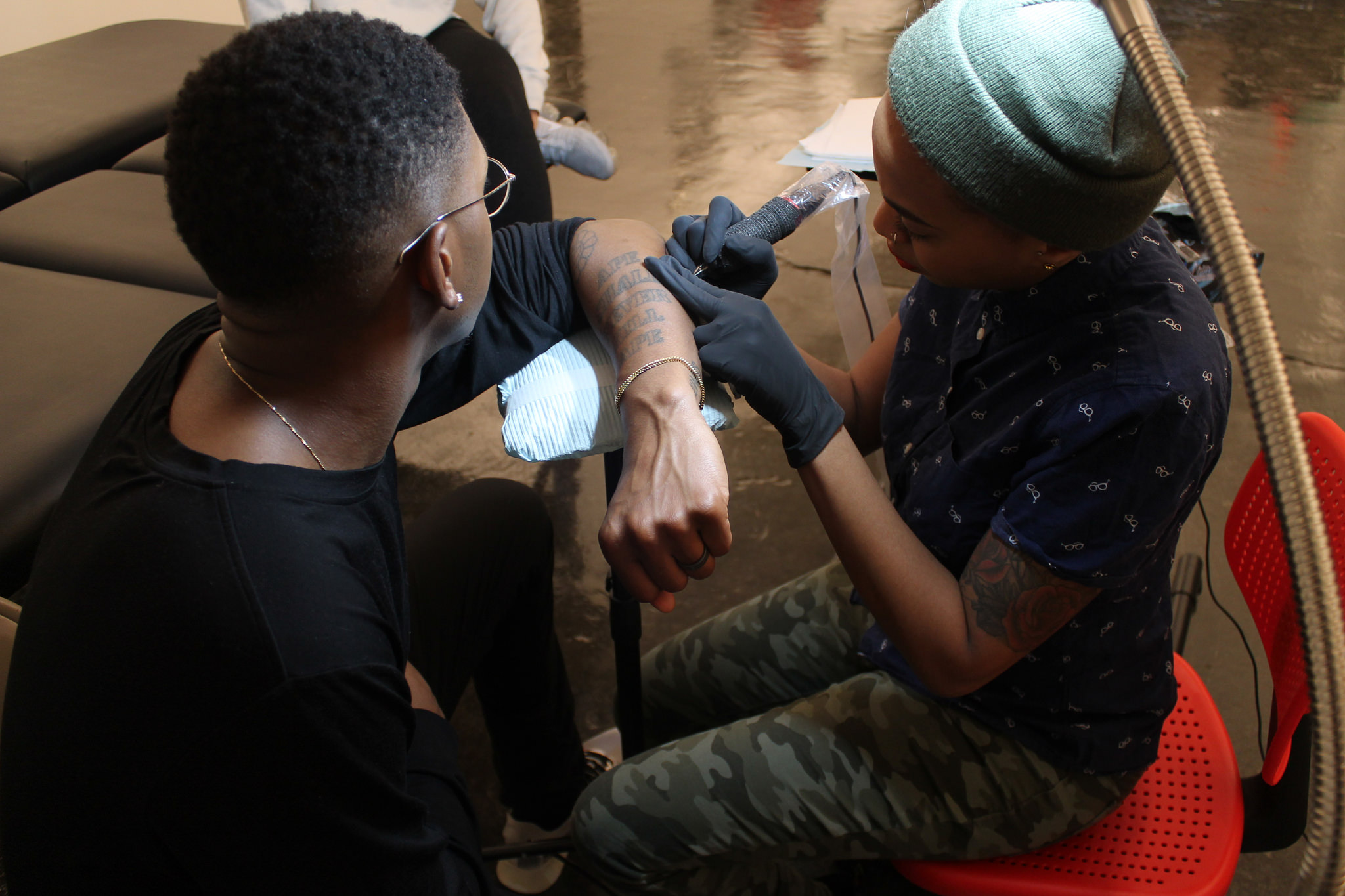
Doreen Garner works on a tattoo at Recess as part of her project “Invisible Man Tattoo.” © Recess.
Black panthers cover the walls and are now inked on the bodies of visitors to Doreen Garner’s pop-up shop, Invisible Man Tattoo at Recess Assembly. The subject of the blockbuster Marvel movie and symbol of the 1960s socialist party is one of many flash tattoos created by Garner with designer Donte Neal. Through March 3, visitors who identify as Black can receive free flash tattoos, and more elaborate tattoos are available for purchase for all visitors regardless of self-identification. Garner—a licensed tattoo artist—encourages visitors to discuss the meaning of their selections. Collected video recordings from participants are on display in the waiting room of the shop.
The title of the project also nods to the 1952 novel by Ralph Ellison, Invisible Man. The narrator of the novel is an unnamed Black man who explains, “I am invisible, understand, simply because people refuse to see me.” Garner’s project uses permanent body art to make invisible histories and experiences indelible. By curating imagery related to the African Diaspora as well as the experiences of heroic and historic Black people, Garner endeavors to open the American tattoo aesthetic to include and celebrate Black culture.
This Week in Black History
- The exhibition, Figuring History: Robert Colescott, Kerry James Marshall, Mickalene Thomas, is open at the Seattle Art Museum through May 13. Three American painters confront the narrow canon of Western painting through masterful and poignant representations of Black histories and experiences. Art Historian and critic, Gayle Clemans at the Seattle Times, heralds the show as “a powerful, important exhibition that really must be experienced in person.”
- In a new video for Art21’s New York Close Up series, Doreen Garner discusses her mission to convey trauma, focusing on the appalling medical experiments conducted on enslaved Black women by Dr. J. Marion Sims for a recent project at Pioneer Works.
- Over President’s Day weekend, the National Portrait Gallery in Washington, D.C. documented an increase in its visitors by over 300%. The spike in museum-goers accompanies the recent installment of the Obama’s presidential portraits by artists Kehinde Wiley and Amy Sherald.
- Thirteen artists are included in Art21’s new playlist, “Portraying the Black American Experience,” touching on race, bias, and representation in American art.
Upcoming Commissions
- Tate Modern announced last week that Tania Bruguera is the museum’s next commissioned artist for Turbine Hall, with new work opening in October.
- The Madison Square Garden Conservancy reports that a show of works by Diana Al-Hadid will be unveiled this May in Madison Square Park. The public installation will combine sculptural elements and plant matter, exhibited alongside Diana Al-Hadid: Delirious Matter at the Bronx Museum of Art from May 23 through October 14.
- Ernesto Neto is at work on an elaborate installation for Zurich’s main train station. Using strips of cotton, Neto will create a makeshift tree canopy called GaiaMotherTree, opening at the end of June.
The Artist Speaks
Ai Weiwei describes Remembering, a work from his 2009 exhibition at the Haus der Kunst in Munich, as one of the most compelling of his career. The backpacks of over 9,000 children were used to spell out a sentence written to Ai from the mother of a child killed in the earthquake in Sichuan. Reflecting on the work, Ai said:
“I have made many other works relating to the Sichuan earthquake, but this one had a profound impact on how I deal with social and political issues. It’s about a real-life tragedy, the human condition, civil rights—an embodiment of my passion and imagination. If I hadn’t engaged with that tragedy, I would not be the artist I am today.”
The text was published in The Guardian from an edited excerpt of the podcast, The Start.